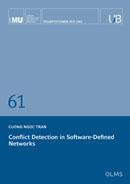Conflict detection in software-defined networks
Über dieses Buch
The SDN architecture facilitates the flexible deployment of network functions. While promoting innovation, this architecture induces yet a higher chance of conflicts compared to conventional networks. The detection of conflicts in SDN is the focus of this work.
Restrictions of the formal analytical approach drive our choice of an experimental approach, in which we determine a parameter space and a methodology to perform experiments. We have created a dataset covering a number of situations occurring in SDN. The investigation of the dataset yields a conflict taxonomy composed of various classes organized in three broad types: local, distributed and hidden conflicts. Interestingly, hidden conflicts caused by side-effects of control applications‘ behaviour are completely new.
We introduce the new concept of multi-property set, and the ·r (“dot r”) operator for the effective comparison of SDN rules. With these capable means, we present algorithms to detect conflicts and develop a conflict detection prototype. The evaluation of the prototype justifies the correctness and the realizability of our proposed concepts and methodologies for classifying as well as for detecting conflicts.
Altogether, our work establishes a foundation for further conflict handling efforts in SDN, e.g., conflict resolution and avoidance. In addition, we point out challenges to be explored.
Cuong Tran won the DAAD scholarship for his doctoral research at the Munich Network Management Team, Ludwig-Maximilians-Universität München, and achieved the degree in 2022. He loves to do research on policy conflicts in networked systems, IP multicast and alternatives, network security, and virtualized systems. Besides, teaching and sharing are also among his interests.
Die Druckausgabe können Sie direkt über den Olms Verlag oder über buchhandel.de erwerben.
Downloads

Downloads
Veröffentlicht
Reihe
Lizenz
Copyright (c) 2023 Cuong Ngoc Tran

Dieses Werk steht unter der Lizenz Creative Commons Namensnennung 4.0 International.

